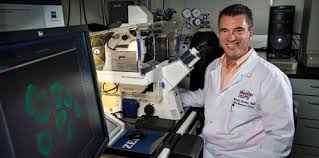Fulton family matches ALS Association grant to identify new treatments
In August of 2014, led by Shafeeq Ladha, MD, and Robert Bowser, PhD, and resident Sam Laali, MD, nearly 30 doctors, researchers, residents and staff from the Gregory W. Fulton ALS and Neuromuscular Disorders Center at Barrow Neurological Institute collectively accepted the ALS Ice Bucket Challenge and, in turn, dared the Arizona Diamondbacks and other VIPS, residents, medical students and donors to join the awareness campaign.
One year after the ALS Ice Bucket Challenge made headlines across the nation, researchers at Barrow Neurological Institute have announced the launch of a novel and potentially breakthrough ALS study that is being funded in part by money raised through the challenge.
The focus of the study is to determine why individuals with ALS progress differently through the many stages of the disease and to help identify better treatment options. The research is being funded by more than $500,000 donated to Barrow Neurological Institute by the ALS Association through last year’s Ice Bucket Challenge. A matching gift to Barrow Neurological Foundation from well-known businessman Ira A. Fulton and his wife, Mary Lou, has doubled the funds available for the research project. The Fultons’ late son, Gregory, received care for ALS at Barrow.
Researchers at the Fulton ALS Center at Barrow believe there may be various types and causes of ALS, commonly known as Lou Gehrig’s disease. This study, which will closely monitor 150 to 200 patients over the course of two years, will follow subgroups of individuals with the disease to study genetic and biological mechanisms and how they may cause patients to progress and respond differently.
There are minimal treatment options for ALS and there is no cure. Some specialists believe the lack of options is because most research has been based on the assumption that all ALS patients have the same form of the disease.

Dr. Robert Bowser, Director of the Gregory W. Fulton ALS Research Center
“Our goal in this study is to better understand how various mechanisms contribute to ALS and to determine why patients progress differently through the disease,” says Dr. Robert Bowser, Director of the Gregory W. Fulton ALS Research Center. “We hope that the findings from this study will help us identify better targeted treatment options and therapies for patients.”
Barrow’s ALS Center, which is part of Dignity Health St. Joseph’s Hospital and Medical Center, has become a national leader in ALS treatment and research. Dr. Bowser was recently named recipient of the most prestigious honor in ALS research. Selected as the 2015 winner of the Sheila Essey Award given by the American Academy of Neurology and the ALS Association, Dr. Bowser is being honored for his significant contributions to ALS research. Last year, the director of Barrow’s Department of Neurology, Dr. Jeremy Shefner, received the coveted award, making Barrow the only facility in the world with two Sheila Essey Award recipients.
“We are really proud to be at the forefront of research and medical treatments for ALS,” says Dr. Bowser. “We’re grateful to the Fulton family and the ALS Association’s Ice Bucket Challenge for supporting our research so we can help end this devastating disease.”
— Barrow —
About Barrow Neurological Institute
Barrow Neurological Institute at Dignity Health St. Joseph’s Hospital and Medical Center is an internationally renowned medical center that offers care for people from throughout the world with brain and spine diseases, disorders and injuries. More brain surgeries are performed at Barrow than any hospital in the United States and the Institute trains more neurosurgeons than anywhere in the world. St. Joseph’s is consistently voted among the top hospitals in the United States for neurology and neurosurgery. For more information about Barrow, visit www.thebarrow.org. For information about Barrow Neurological Foundation, visit www.supportbarrow.org.
About Barrow Neurological Foundation
Barrow Neurological Foundation is a non-profit organization dedicated to raising funds for patient care, medical education and research at Barrow Neurological Institute. More information is available at www.supportbarrow.org.
